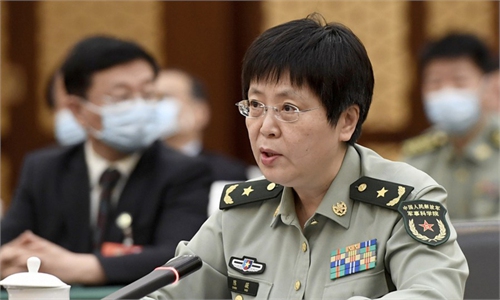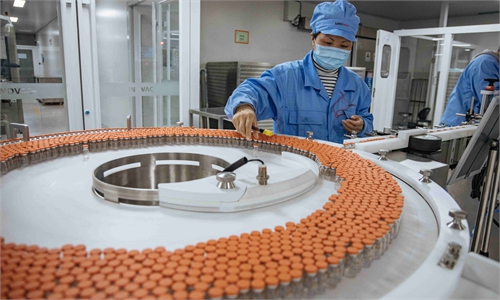TWO SESSIONS 2021
UPDATE: CPPCC member suggests core research white list in biotechnology to tackle strangleholds

Photo of Chen Wei at the Photo Beijing 2020 on Sunday Photo: Xu Liuliu/GT
China could establish a white list of core research teams with stable national sponsorship and promote the necessary replacement of imported technologies and products with domestic pharmaceutical products to tackle strangleholds in biotechnology, members of the National Committee of the Chinese People's Political Consultative Conference (CPPCC) and National People's Congress (NPC) have proposed.
Chen Wei, a vaccine scientist who developed the country's first single-dose coronavirus vaccine, suggested that China compile a white list, with stable and long-term national investment in key research teams, to integrate specific projects, technology bases and talent.
Such a mechanism will lay a solid scientific foundation for protecting the nation's development interests and addressing the risks of foreign blockades of key technologies, Chen said.
She made the remarks on Sunday at the second plenary meeting of the fourth session of the 13th National Committee of the CPPCC.
She also proposed a national vaccine technological innovation center to meet the demand for biosecurity. The center will enhance top-level design and overall plans to carry out interdisciplinary cooperation.
Industry insiders said that China still relies heavily on imported Western high-end equipment, machines and materials in biopharmaceutical industrial chains, as well as biotech research and development (R&D) in sectors such as vaccines. That could pose a risk if the international situation undergoes significant changes.
"For example, we still have gaps in the R&D of combination vaccines and conjugate vaccines. There are also some vaccines, such as the zoster vaccine, HPV9, which we have not yet developed and marketed," a manager from an A-share listed vaccine manufacturing company told the Global Times on Sunday on condition of anonymity.
But he added that there is no difference in the quality of the vaccines that are on the market and there is no bottleneck in vaccine manufacturing
The global vaccine market is dominated by international giants such as Pfizer and Sanofi, and there is no highly competitive vaccine company in China.
"Vaccine R&D takes a lot of talent and money. It is hoped that the government will provide R&D funding support to enterprises linked to high technology, livelihoods and national security," the manager added.
The Vaccine Management Law, formally implemented in December 2019, explicitly encourages vaccine enterprises to produce and export vaccines in accordance with international procurement requirements.
Li Yan, the president of Qilu Pharmaceutical and an NPC deputy, said in his proposal to this year's annual session of the NPC that relevant companies should encourage "domestic replacements" in cases where the quality of domestically developed bioproducts inches closer to that of foreign peers.
Li also suggested that the government should encourage the development of new targets and products that are at the forefront of global biotechnology, such as next-generation antibody combination technology, innovative dual-target antibody technology, oncolytic viruses and oral biology.
A shareholder surnamed Zhang of a Chinese ventilator enterprise told the Global Times on Sunday that it is no problem for China to manufacture high-end medical equipment such as ventilators, but China's ability to develop and design medical equipment is still lagging behind the world's advanced level.
"But China has completed the iterative upgrade from 'Made in China' to 'Intelligent Made in China' in terms of medical ventilators, and it has become an indispensable and important force in the international industry.
"When the SARS epidemic broke out in 2003, China's medical ventilator market was still in its infancy, with a serious supply shortage, and mainly relied on imports," Zhang added.


